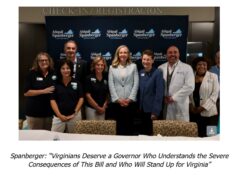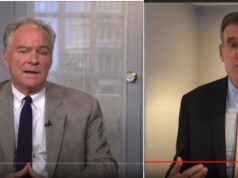by Lynlee Thorne, Political Director of Rural Ground Game
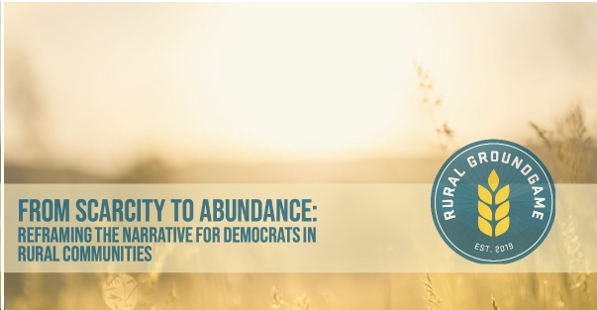
In the dark days of December 2016, I unrolled a sheet of butcher paper on the floor in front of the woodstove, borrowed my children’s washable markers and created a map.
I had been listening to a friend describe her work on the ground with FEMA after Hurricane Katrina. Following a disaster, the path towards long term recovery is a fast analysis and cataloging of the available network of resources and then a strategic plan to coordinate those resources and effectively distribute immediate relief while simultaneously planning for the long term needs for a more resilient future.
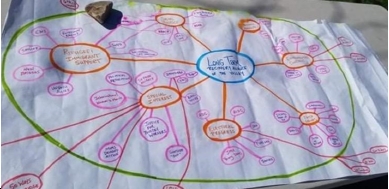
In the aftermath of a different kind of disaster, the 2016 election, I desperately needed a reminder that there were many people within my community fighting for social, climate, and criminal justice and working to support our immigrant communities, worker’s rights, education, farms, housing access, food security etc. As my web exploded on the page, I discovered a shift in my own thinking about what might be possible in the future even in my own heavily Republican county and neighboring localities if we could find a path to more meaningfully support the great work already being done by incredible community leaders and their organizations in a way that might (over time) provide positive electoral outcomes for Democrats.
In the meantime, I was able to shed the hopelessness that comes with operating from scarcity towards a determination to cultivate trust and earn support from abundant potential.
We’ve heard plenty of commentary, especially following the 2021 election here in Virginia, about the significant challenges Democrats face in rural communities. While identifying the problems is essential, it is time to sprint towards the solutions.
In 2019, Rural GroundGame was founded as a cooperative out of necessity to be a first step towards those solutions. Rural campaigns simply could not afford to pay for multiple or in some cases any paid staff to run their campaigns effectively. That year, over a dozen rural campaigns paid a monthly fee and RGG gave them access to professionally trained staff with multiple cycles of experience in rural VA. In addition to those critical aspects of effective campaigning, we also built a community.
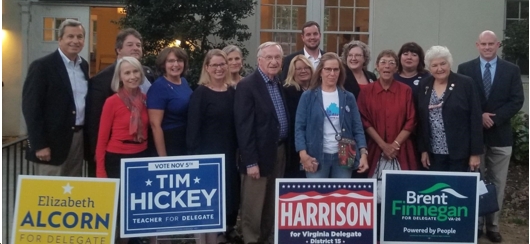
2019 was a great year for Democrats. If we compare it to 2017, the average Democratic campaign saw an increase of 3 points, whereas the Rural GroundGame races saw an uptick of 11 points. Unfortunately, that progress was still not enough to send any of those candidates to Richmond but rural Democrats know that “There’s victory in building a bridge that someone else gets to cross.”
After a proof of concept in 2019, with data to support our success, we refined our program and our goals. In 2021, RGG transitioned to a PAC filed with the FEC and with a Virginia affiliate which allows us to do our own fundraising in order to offer our services at an extremely discounted rate or as an in kind contribution. This transition meant that we got a much later start last year and while we were honored to assist many campaigns, we also know that the earlier in the cycle campaigns receive support, the more impact our work will have.
As we commit to building a lasting, durable infrastructure, we are offering to serve rural Democratic committees year round and long term. We are developing strategic messaging and creative, data-informed community outreach programs with the intention of seeking out opportunities to build trust with the people represented in the web of long term recovery who are already working towards meaningful change in their communities.
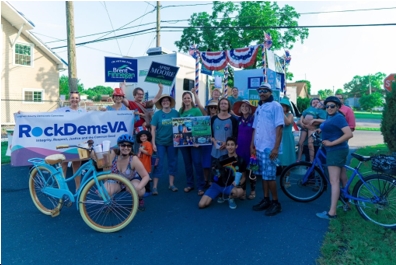
Where can we find an abundance of opportunity?
The pandemic has revealed many things about our society and just one of them is a growing interest in securing basic protections for workers. Public approval of labor unions continues to steadily climb. This offers Democrats a wealth of opportunity to seed the ground with a diverse coalition of working class Americans in the cities, suburbs and countryside all seeking safety and fairness in their workplaces.
In rural communities, manufacturing facilities are often rich in diversity. “Organizing campaigns that focus on rural manufacturing workers can play an important role in tackling economic inequality, systemic racism, and gender inequality.”
The opportunity to earn votes by directly supporting the normalization of union organizing in both our messaging and, more importantly, our policy is not limited to manufacturing. If we are searching for pathways to protect and fund our public schools, unions offer a powerful, sustainable mechanism to center and support our educators. “For a glimpse at how the energy of workplace action can potentially feed into changes in political office, consider the case of Kentucky, where a teacher-led political insurgency took down Republican governor Matt Bevin.”
The door is wide open for any political party to build trust with voters by substantively prioritizing people over corporations. Rural communities are under the thumb of the oppressive, consolidated power of corporate monopolies that have stripped away local power. “A nationwide poll [last] year revealed that a striking 81 percent of rural voters would support a candidate who said, “A handful of corporate monopolies now run our entire food system. We need a moratorium on factory farms and corporate monopolies in food and agriculture.”
Sen. Jon Tester’s Right to Repair bill offers farmers a concrete, bottom line deliverable that also hits a lot of rural folks right in the feels by honoring the widely cherished value of scrappy self-reliance while putting people before corporate profits. “They need to be able to repair their own equipment, and this legislation will secure them that right.”
Many rural Americans share a deep resentment of opportunistic outsiders parachuting into our communities to extract resources for profit. Democrats have the opportunity to fight for our climate and for people by standing with communities and supporting the many expert local leaders mobilizing to oppose carbon pipelines. “Pipeline resistance—initially energized around issues of land and water rights—has sparked a progressive populism in red-state America, defined by unlikely multi-racial alliances and an excitement about winning electoral power. That populism may just hold the key to transforming the Democratic Party into a force that fights against corporate power and for working people—and wins.”
Left with few defenses against consolidated power in manufacturing, agriculture, energy, education, healthcare, etc. it may feel like having a real voice is impossible. Many of the folks feeling anger and grief at the kitchen table aren’t motivated to vote at all. Casting a ballot to form a union in their own workplace may be a game-changing, empowering first step towards the mobilization of new and first time voters, but only if we step up to declare which side we are on.
There is abundant potential to make significant electoral gains by summoning the political courage to put our values into practice and deliver results that can be felt at the kitchen table. The opportunity exists now—but it won’t last forever.
How do we build a collaborative culture with the broadest coalition possible to meet shared goals?
We are a big tent if and only if we are intentional about being inclusive and that might mean linking arms with individuals or organizations we may not love (or may not even like), but who at least have a mutual understanding that our own wellbeing is intimately tethered to the wellbeing of a diverse team of friends and rivals seeking justice.
We can ground ourselves in gratitude and awareness of the vast opportunities to make meaningful progress by supporting existing resources and leaders within our communities. We’ve been honored to serve incredible candidates and rural committee leaders and members who step up to carry our values into challenging spaces. These folks deserve both our admiration and substantive, ongoing support.
Beyond rural Virginia, we are bolstered by and grateful for the commitment from a growing list of grassroots organizations, elected officials, and candidates from both the Urban Crescent and the countryside to deliver resources, develop partnerships, and move forward together.
When he joined us for an event in December of last year, Sen. Tim Kaine shared these words in the chat.
“I am thinking about how my father in-law Lin Holton, a rural Virginian who would be a pro-civil rights D [sic] today would respond… And he would tell us all the same thing he told Anne and her siblings every morning when he woke them up: ‘It’s opportunity time!’”
Let’s get to work. It’s opportunity time.
Join us for events this week:
Tuesday February 22 @7pm

Running for Office in Rural Virginia: Recruiting & Supporting Diverse Candidates
Thursday, February 24 @7pm on Zoom
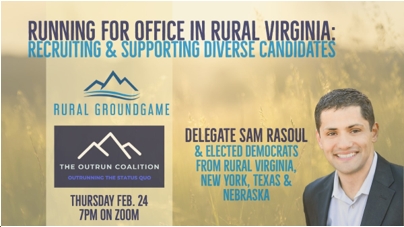
Check out our (soon to be updated!) website: www.ruralgroundgame.org
Support our work: https://secure.actblue.com/donate/ruralgroundgame
Or get in touch: Hello@ruralgroundgame.org



